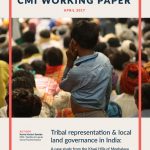Alicia Yamin (2018)
Author: Alicia Ely Yamin What is the role for strategic litigation of social rights, and in particular health rights, in a world where democratic social practices and institutions are loosing ground and where conservative agendas seek to revoke the rights of minorities? In a recent article in “Open Global Rights”, Alicia Ely Yamin argue that […]
Mathilde Thorsen (2018)
Bergens Tidende Debatt 19.07.2018
Mathilde Thorsen has written about water rights and the ongoing water crisis in India in Bergens Tidende. The text ask questions regarding who is in charge of securing people water, and call for global cooperation and respect of the human right to water. You can read the full text in Norwegian below or on Bergens […]
Kavita Navlani Søreide (2018)
Economic & Political Weekly Vol. 53, Issue No. 29, 21 Jul, 2018
Kavita Navlani Søreide has a new publication regarding land rights in Meghalaya in the newest volume of Economic & Political weekly. Mismanagement of Land in Meghalaya The recent clashes in Shillong between the indigenous Khasis and the minority Dalit Sikh community, cannot be dismissed as merely communal identity politics at play. The roots of the […]
Olman Rodríguez Loaiza, Sigrid Morales, Ole Frithjof Norheim, and Bruce M. Wilson (2018)
Health and Human Rights
Abstract In response to the incremental creation of an expansive constitutional right to health in Costa Rica, the country’s rights-friendly constitutional chamber of the Supreme Court (known as the Sala IV) unleashed a flood of litigation for medications, treatments, and other health care issues. This development was met by widespread criticism from within the health […]
Authors: Camila Gianella Marta Rodriguez de Assis Machado Angélica Peñas Defago Latin America is the only region in the world where adolescent pregnancies are not decreasing. According to a recent article in the Lancet, if the current trend continues, Latin American countries will not fulfill the sustainable development goal on adolescent pregnancy by 2030. This underperformance has […]
Alicia Ely Yamin and Allan Maleche (2017)
BMC International Health and Human Rights
Applying a robust human rights framework would change thinking and decision-making in efforts to achieve Universal Health Coverage (UHC), and advance efforts to promote women’s, children’s, and adolescents’ health in East Africa, which is a priority under the Sustainable Development Agenda. Nevertheless, there is a gap between global rhetoric of human rights and ongoing health […]
Kavita Navlani Søreide (2017)
CMI Working Paper n. 4, 2017
A case study from the Khasi Hills of Meghalaya In India, the Schedule Tribes have remained on the fringes of growth, but less so in the majority tribal areas of the North East. This has increased the interest in the Sixth Schedule, the special constitutional provision relating to these areas, recognising the tribal communities’ rights […]
Malin Solheim Moldestad (2016)
Moldestad’s MA thesis I løpet av to år gjekk Norge frå å vere ei sinke når det gjelder transpersonar sine rettar til å bli eit føregangsland med diskrimineringsvern grunna kjønnsidentitet og kjønnsuttrykk og verdas mest liberale lov om endring av juridisk kjønn. Oppgåvas målsetnad er å undersøkje kva som var bakgrunnen for den nye lova […]
B, Camila Gianella, Brian Citro, Evan Lyon, et. al (2016)
Health and Human Rights Journal vol. 18. No. 1.
This special section of Health and Human Rights Journal focuses much-needed attention on tuberculosis (TB) and human rights—particularly the right to health. Even as TB has surpassed HIV as the top infectious disease killer in the world and the global threat from multidrug-resistant TB (MDR-TB) continues to grow, approaches to fighting the disease remain primarily […]
A, Camila Gianella, César Ugarte-Gil, Godofredo Caro, et. al (2016)
Health and Human Rights Journal vol. 18. No. 1.
This article analyzes the factors associated with vulnerability of the Ashaninka, the most populous indigenous Peruvian Amazonian people, to tuberculosis (TB). By applying a human rights-based analytical framework that assesses public policy against human rights standards and principles, and by offering a step-by-step framework for a full assessment of compliance, it provides evidence of the […]
 Caliban Unleashed: What role for strategic litigation in an illiberal era?
Caliban Unleashed: What role for strategic litigation in an illiberal era?




